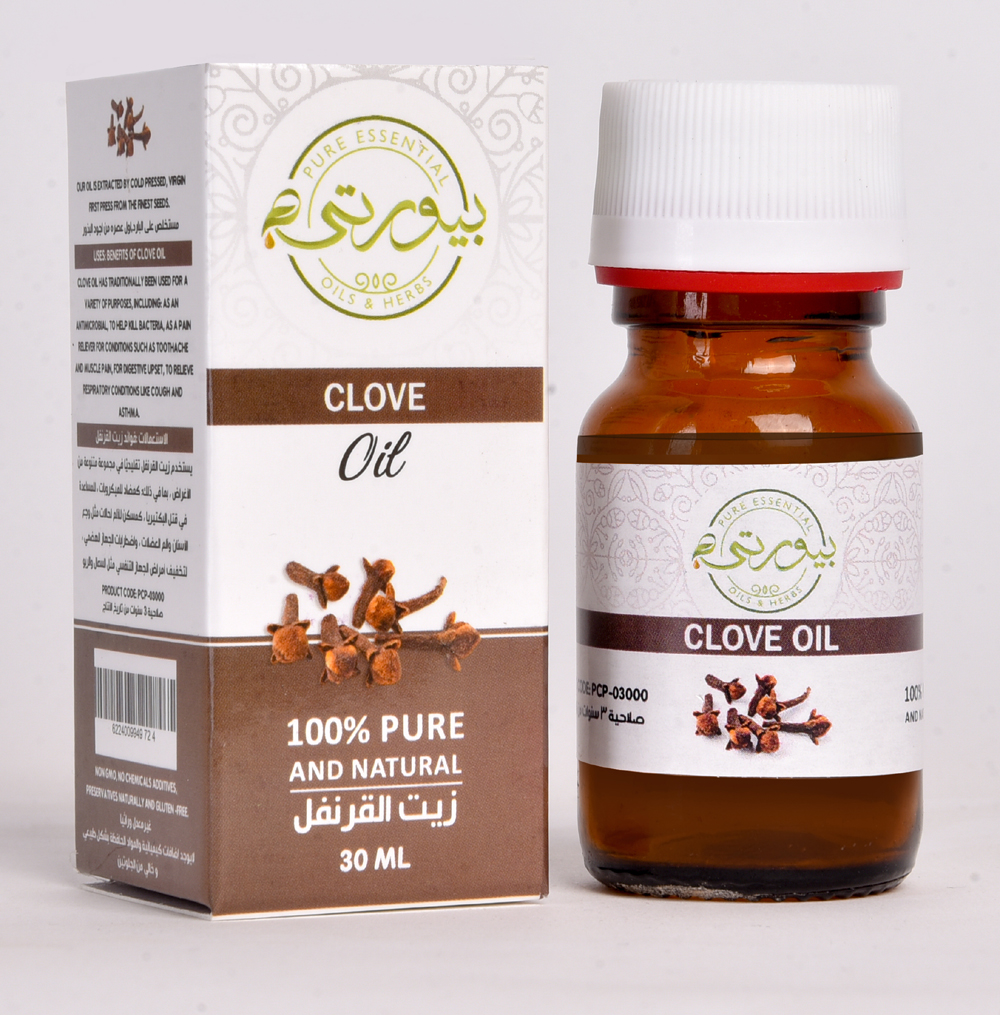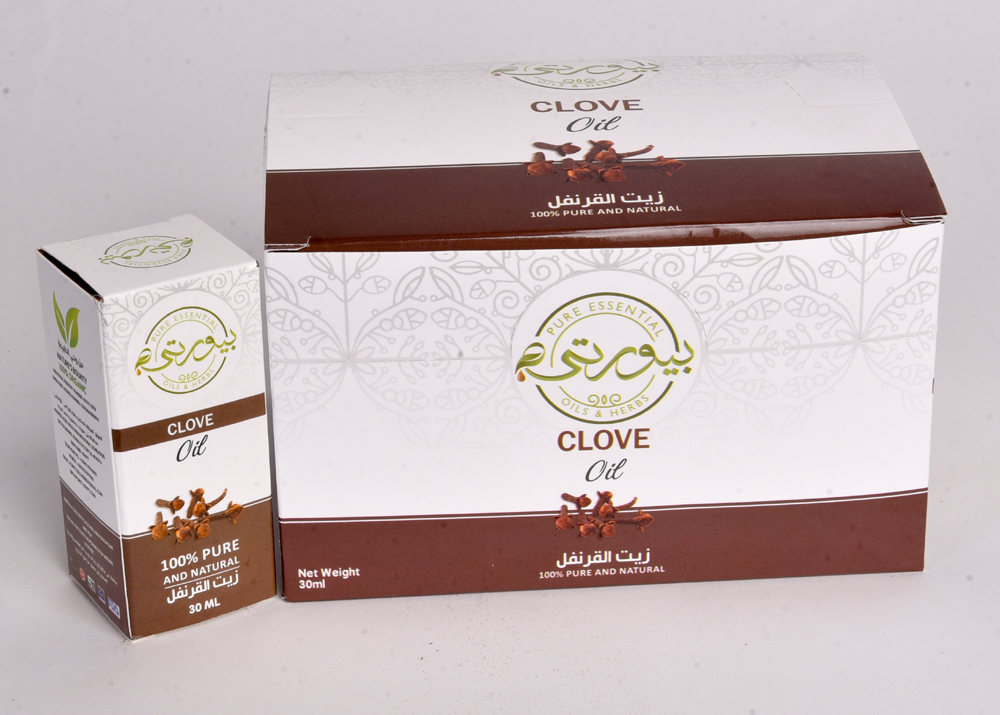Clove buds Infused Oil (Clove buds or essential oil infused in Carrier Oil)
Login to view prices
Clove bud infused Oil, consists of a carrier oil that has been permeated (“infused”) with Clove bud or mixed with Clove bud essential oil . The benefit to using an infused oil as opposed to a plain carrier oil is that the infused oil will contain the properties of both the carrier oil and Clove bud and is suitable for direct use for consumer
This Product for Consumer Retail packaging. if you are interested in Bulk Packaging to buy the oil as raw material, Please browse our Raw Materials
This product is infused oil in diluted form suitable for direct use not very concentrated like essential oil which can not be used directly. please read details below about what is infused oil?
Overview
Clove oil is an essential oil that’s derived from clove trees. The clove tree, known as Syzygium aromaticum, is native to Southeast Asia, although today you may find it growing in other locations, too.
Clove oil is produced by distilling the dried flower buds that are collected from the clove tree. Other parts of the tree, such as the stem and leaves, may also be used.
Clove oil, which ranges in color from colorless to light yellow and has a strong, spicy aroma, has been used for centuries in a variety of applications.
What are the benefits of clove essential oil?
Clove oil has traditionally been used for a variety of purposes, including:
Antimicrobial activity
In a study from 2012, researchers found that clove oil had the ability to kill staph bacteria cells in liquid culture and in biofilm. A biofilm is a community of bacteria that lives together, shielded by a protective, slimy film.
Most antibiotics aren’t effective at penetrating the biofilm and killing staph bacteria but, according to this study, clove oil seems to be able to.
A 2017 study looked at the antifungal activity of several essential oils. Of the oils tested, clove oil was the most effective at stopping the growth of a range of fungi with environmental origins.
In a 2005 study , researchers investigated the effect of eugenol, a major component of clove oil, on the yeast Candida albicans. This yeast can cause fungal infections such as athlete’s foot, oral thrush, and vaginal yeast infections.
According to the authors of the study, eugenol had the ability to kill the yeast, both in culture and in a rat model.
A 2018 study looked at the effect of essential oils on a variety of bacteria that cause respiratory infections, such as pneumonia and influenza.
Although the effects were lower than the antibiotics tested, clove oil did have antibacterial activity when added to liquid culture or introduced as a vapor.
Summary
Clove oil can be effective at stopping the growth of some types of bacteria and fungi.
Dental uses
In 2012, researchers investigated the effect of clove oil on the dental erosion of teeth by acidic beverages, like apple juice. Dental erosion of teeth can lead to cavities.
According to the study, clove oil and its molecules were effective at preventing dental erosion, leading the authors to believe that clove oil may work in a similar way to fluoride in preventing cavities.
A 2016 study tested 10 natural plant products to see how effective they were against organisms that cause oral cavities. Clove oil was found to be the most effective at inhibiting cavity-causing organisms.
A 2006 study compared the pain-relieving ability of clove gel and benzocaine.
Researchers found that participants who were tested with either clove oil or benzocaine had significantly lower pain scores than the placebo group. This led the authors of the study to believe that clove oil may be effective as a topical anesthetic.
Summary
Clove essential oil may help prevent cavities and relieve oral pain.
Skin applications
In 2017, researchers tested clove oil to see whether, when applied to the skin, it had any effect on chronic itching. The study found that, compared to petroleum oil, clove oil significantly relieved itching.
A study from 2007 compared the topical use of clove oil cream in the treatment of anal fissures with stool softeners and lignocaine cream.
After 3 months, researchers noted healing in 60 percent of people in the clove oil group, compared to only 12 percent in the stool softeners and lignocaine group.
Summary
When applied to the skin, clove oil may be effective at relieving itching and promoting healing.
Anticancer properties
A study from 2014 looked at the effect that clove oil had on a line of human breast cancer cells in vitro, which means the cells were tested in a dish or test tube. The researchers found that clove oil, in certain quantities, was toxic to the cancer cells.
In another in vitro studyTrusted Source, researchers found that clove oil stopped the growth of several cancer cell lines, including but not limited to breast, cervical, and colon cancer. Clove extract also increased cell death and disrupted cell division in a colon cancer cell line.
Summary
In a test tube, clove oil seems to be effective at killing cancer cells or stopping them from growing. However, further research is needed to investigate clove oil’s anticancer properties.
How to use
There are several ways you can use clove oil at home. Here are some suggestions:
Spray
Using the oil as a spray is an easy way to add the spicy scent of clove to a room. Or perhaps you’d like to make use of clove oil’s antimicrobial properties and use it as a mild disinfectant. To make a clove spray:
Add several drops of clove oil to water. The National Association for Holistic Aromatherapy (NAHA) suggests 10 to 15 drops per ounce of water.
Since essential oils don’t dissolve in water, you may want to add a dispersing agent such as solubol to the solution as well.
Be sure to shake the bottle well before spraying.
Diffusion
Like spray applications, using a diffuser can help spread the aroma of clove throughout a room. When diffusing clove oil, be sure to carefully follow the instructions that came with your diffuser.
When spraying or diffusing clove oil, make sure the room is well-ventilated.
Topical
There are a couple of ways to apply clove oil to your skin if you want to use it for pain relief, wound healing, or to ease itching:
Massage oils. Dilute clove oil in carrier oil, such as jojoba, coconut, or olive oil. The NAHA suggests using 15 drops of clove oil per ounce of carrier oil in order to create a 2.5 percent solution.
Creams, scrubs, or lotions. Dilute clove oil in an unscented product, such as a lotion or facial cream. The NAHA recommends a 1 to 2.5 percent dilution for normal skin and a 0.5 to 1 percent dilution for sensitive skin.
Dental
Do you have a toothache? Dabbing clove oil onto your sore tooth may help to relieve the pain until you can get to see a dentist. To use clove oil for a toothache, follow these steps:
Dilute a few drops of clove oil in an edible carrier oil, such as olive or coconut oil.
Dab a clean cotton ball into the solution, allowing it to soak in.
Avoiding contact with your gums, apply the cotton ball to the sore tooth. It may take a few minutes of application to feel relief.
Reapply every 2 hours as necessary.
===============
What is Infused Oil?
An infused oil, also referred to as a macerated oil, consists of a carrier oil that has been permeated (“infused” or “macerated”) with one or more herbs or the essential oil of that herb. The benefit to using an infused oil as opposed to a plain carrier oil is that the infused oil will contain the properties of both the carrier oil and the herbs or essential oil and is suitable for direct use for consumer without lot of precautions like concentrated essential oils
Some plants do not have much essential oil contained in them, and in those cases, it is rare or impossible to commercially find an essential oil for that plant species. Infusing the herb into a carrier oil, however, can be a suitable way to still use the herb for aromatherapy purposes.
Infused oils generally have an oily feeling that varies depending on the carrier oil used. They also are not as concentrated as essential oils.
What are carrier oils?
Carrier oils and essential oils are made from plants. Carrier oils are used to dilute essential oils and “carry” them to your skin. That’s because essential oils are potent and can cause irritation when applied directly to your skin.
Most carrier oils are unscented or lightly scented and don’t interfere with an essential oil’s therapeutic properties. They may be used alone or with other oils to nourish your skin.
=========================
What examples of carrier oils we use to make our infused oils?
1. Coconut oil
Coconut oil is an edible oil made from the meat of mature coconuts. It’s available in refined or unrefined varieties. Unrefined coconut oil comes from fresh coconut meat. It’s not processed with chemicals and retains its coconut aroma and flavor. Refined coconut oil comes from dried coconut meat, also called copra. It’s bleached and deodorized to remove contaminants, as well as the distinct coconut aroma and flavor. Refined coconut isn’t all-natural and isn’t recommended for use as a carrier oil.
Uses: Coconut oil contains skin-nourishing fatty acids and polyphenols, which make it a great carrier oil for massage oils and skin care preparations.
2. Jojoba oil
Jojoba oil comes from the seeds of the jojoba plant. It has a delicate, nutty aroma. Technically, jojoba isn’t an oil, but a wax with powerful moisturizing properties. It’s thought to closely mimic sebum, the skin’s natural oil. Using jojoba oil may help reduce the skin’s oil production in acne-prone people by making the skin think it’s produced enough oil.
Uses: Jojoba oil absorbs easily in the skin and doesn’t clog pores. This makes it a good carrier oil option for massage oils, facial moisturizers, and bath oils.
3. Apricot kernel oil
Apricot kernel oil is made from apricot seeds, also known as kernels. It’s an emollient oil high in fatty acids and vitamin E. It absorbs easily into the skin and has a slightly sweet, nutty scent. You can buy edible apricot kernel oil, or apricot kernel oil for cosmetic use only.
Uses: Apricot kernel oil is thought to help soften and calm irritated, itchy skin. Use it as a carrier oil to make massage oils, bath oil, and hair care preparations.
4. Sweet almond oil
Sweet almond oil has a strong, nutty aroma. It’s an edible oil made from the kernels of sweet almonds. The oil is lightweight and absorbs easily, and is a great moisturizer for dry skin.
It’s also used in general aromatherapy, but its strong scent may mask an essential oil’s aroma.
Uses: Sweet almond oil is one of the most popular carrier oils for skin care. It’s great in massage oils, bath oils, and soaps.
5. Olive oil
Olive oil comes from pressed olives. It’s best known as a healthy, edible oil with a fruity aroma, but it’s also used in aromatherapy as a carrier oil.
Extra-virgin olive oil is the preferred variety for aromatherapy and skin care preparations. Olive oil’s scent may interfere with the scent of some essential oils.
Uses: It’s packed with fatty acids and plant sterols, which make it great for cleansing and moisturizing dry skin. Use olive oil as a carrier oil for massage, facial cleansers, hair care, and homemade soaps.
6. Argan oil
Argan oil is made from kernels found inside the fruit of argan trees, which are native to Morocco. The oil is edible and is traditionally used to nourish the body inside and out. It has a nutty aroma and is rich in vitamins A and E, and monounsaturated fatty acids.
Uses: Argan oil can help treat dry skin and hair, wrinkles, and skin inflammation. This makes it a terrific carrier oil for general skin care and massage oils.
7. Black seed oil
Black seed oil is made from the Nigella sativa plant. Although it’s lesser known than other carrier oils, it’s richTrusted Source with unsaturated and saturated fatty acids. It’s also thought to have anti-inflammatory abilities.
Uses: Black seed oil is often used as a folk remedy to soothe skin conditions including eczema, acne, and psoriasis. With this in mind, it’s a great choice for facial care, massage oils, and general skin care.
=================================================
Quotation:
· Quantity: There minimum order per each packaging type. kindly contact us to know more details and discuss the best options for you
· Specification: 100% natural and Pure quality Organic or Conventional
· Documentation: COA, MSDS, TDS,.. Kindly see more information tab in the product page to see all documents available
· Payment terms: TT in advance to Our bank account
· Lead time: Shipping through 10 days from receipt of the payment.
· Sea Shipping Time: 35 days
· Air shipping time: 10 days
Branding Services
We also can do customized packaging for you to bottle whatever size you like. We can help in designing labels, selecting good bottles, and packaging. We deliver integrated solutions under your brand..
Additional information
| Weight | N/A |
|---|---|
| Dimensions | N/A |
| Oil Purity | This is infused Oil. Plant, Flowers, Essential oil infused in natural Carrier oil |
| Country of Origin | Egypt |
| Ship from | China, Egypt |
| Cultivation Type | Organic, Conventional |
| Oil Retail Packaging | Size 15 ml , Pack has 12 bottles. Carton has 8 Packs = 96 bottles/carton, Size 30 ml , Pack has 12 bottles. Carton has 8 Packs = 96 bottles/carton, Size 60 ml , Pack has 12 bottles. Carton has 8 Packs = 96 bottles/carton, Size 125 ml , Pack has 6 bottles. Carton has 5 Packs = 30 bottles/carton, Size 250 ml , Pack has 6 bottles. Carton has 4 Packs = 24 bottles/carton, Size 500 ml , Pack has 4 bottles. Carton has 4 Packs = 16 bottles/carton, Size 1000 ml , Pack has 4 bottles. Carton has 2 Packs = 8 bottles/carton |
| HS Code | 33012945 |
| CAS-Code | 8014-13-9 |
| Oil Documentation Available | Allergen Free Certificate, Bovine Spongiform Encephalophathy (BSE) Certificate, Certificate of Analysis (COA), GMO Certificate, GRAS Status Statement, Halal Certificate, Herbal Origin Statement, KOSHER Certificate, Manufacturing Flow Chart, Material Safety Data Sheet (MSDS), Organic Certificate, Pesticide Residual Certificate, Researches & Studies, Technical Data Sheet (TDS), WADA Prohibited list Statement |
| Custom Branding & Packaging | Yes, OEM Custom banding, designing and packaging are available for that product |
| Bulk Packaging Availability | Yes we can provide you the product in Bulk Packaging |
-
Login to view prices
-
-
Login to view prices
-
Login to view prices

















